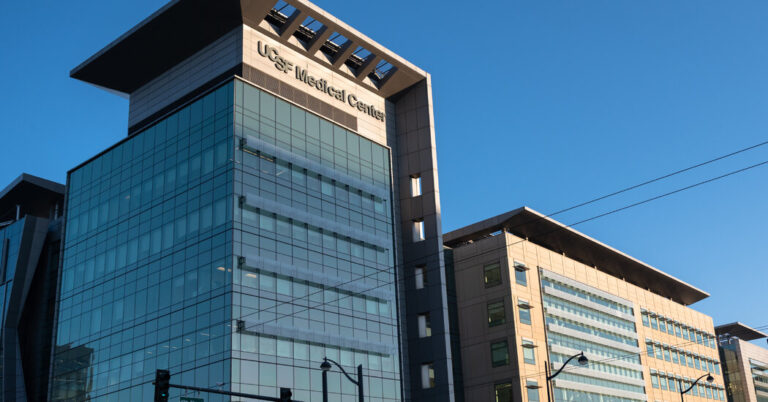To the Editor:
Regarding “Doctors and medical students clash over war protests in San Francisco” (news article, June 25):
When I see patients at UCSF Health, I don’t know their political beliefs and they don’t know mine. I am focused solely on my job – using my medical training to provide excellent, dignified care to all who need it.
That same expertise needs to be more prevalent throughout UCSF. Doctors, nurses, pharmacists, phlebotomists, and all other clinicians and staff must leave their passion and conviction at the door of the hospital, even if it has nothing to do with patient care.
“But your article shows that some UCSF physicians and staff believe that expressing anti-Israel and anti-Semitic views takes precedence over their professional obligations when it comes to patient care. Doing so under the guise of advocating for Palestinians not only hurts patients, but also makes Jewish physicians like me feel unsafe in the workplace.”
Hospital officials have tolerated this behavior in the name of free speech, but UCSF has policies that prevent employees from displaying bias in their white coats. By allowing violations of its own policies, UCSF undermines the trust that patients have in us all to put their needs first.
Tami Lowen
San Francisco
The author is an associate professor of obstetrics, gynecology, and reproductive sciences at the University of California, San Francisco Medical Center.
To the Editor:
If the doctors at UC San Francisco seem to be doing something unprecedented, that’s because the circumstances they’re protesting are unprecedented: Around 500 medical workers have been reported killed in Gaza. Israeli forces have destroyed hospitals, bombed ambulances, and kidnapped doctors on duty.
Doctors like Dr. Adnan al-Bash have died in Israeli prisons, and last month Hani al-Jafarawy, head of ambulance and emergency services, was killed in an attack on a medical facility in Gaza.
Our professional societies have generally avoided taking a position on this crisis, even though they routinely speak out on a whole range of political and social issues: the Black Lives Matter movement, LGBTQ+ health, reproductive justice, the Ukraine war, etc. U.S. medical journals have published few articles on Gaza, in contrast to other global crises.
Like the students in the campus encampment, the doctors protesting the war are multi-ethnic and multi-religious, and include many Jewish colleagues, reflecting the diversity of the medical community. Doctors across the country can learn a lot from UCSF’s doctors.
Amir Mohareb
Boston
The author is a physician at Massachusetts General Hospital and an assistant professor at Harvard Medical School.
To the Editor:
If physicians perceive the hospital in which they work as an arena for political, social, cultural, or other types of conflict, they are putting themselves at serious risk of violating important professional ethics.
Patients, especially seriously ill patients, often literally place their lives in the hands of people they have never met and did not choose as their physicians. If physicians insist on bringing their own personal views about foreign policy (and what hospital needs a foreign policy, anyway?), domestic politics, the culture wars, or other areas of great contention to the bedside, patients are rightful and justified in fearing that they will not receive the care and respect they deserve because of who they are or what they think.
There cannot and should not be separate hospitals for Democrats and Republicans, for Jews, Christians, Muslims, Hindus, atheists, for heterosexuals and homosexuals, for immigrants and native-born Americans, or for those who have greater sympathy or affinity for Israelis and Palestinians.
Of course, doctors can have whatever opinions they want about any issue of the day, but they must leave those opinions in the parking lot when they come to work. To provide the best possible health care to those who need it most, doctors must learn to work across differences and to see the patient in the hospital bed as a human being who needs their help.
Neil W. Schluger
Valhalla, New York
The author is Dean of the Department of Medicine at New York Medical College.
To the Editor:
I am saddened beyond dismay every time I learn of how many times in this country people are harassed and bullied for expressing their concerns and opinions. Universities and other institutions are being forced to take a stand on the Gaza crisis. Experts from these institutions are being bullied and harassed for expressing their concerns and opinions. Old tropes about Jews are being tolerated and billionaires are influencing decision-making regarding protesters within these institutions.
I never imagined something like this could happen in my country, the so-called United States of America, with each side preventing the other from exercising their right to free speech.
I fear that our ability to debate respectfully without silencing each other is being lost, and this will lead to the demise of our democracy.
Lori Paulucci
Brooklyn
To the Editor:
At its best, patient care environments are sacred spaces that exist to support patients and their loved ones. Physicians and students who bring a particular political agenda into a hospital or clinic are betraying the sanctity of that place. They are not fulfilling their responsibility.
Those who wear hijabs or kippas outside of the hospital for religious or cultural reasons should certainly be supported in bringing elements of their spiritual sense of self into the medical environment, but should leave political symbols at home (flags, watermelon buttons, Trump or Biden buttons, even pro-life buttons) even if they have “strong beliefs.”
Doctors have a duty to treat patients with whom they disagree on a range of issues, and they should be proud of that duty, and equally proud to work alongside colleagues with whom they have serious disagreements about politics and world affairs. Sacred space is fragile, and we need to be vigilant in protecting it.
Jonathan M. Rosen
Stamford, Connecticut
The author is an associate professor of medicine at the Larner College of Medicine’s Connecticut campus.

